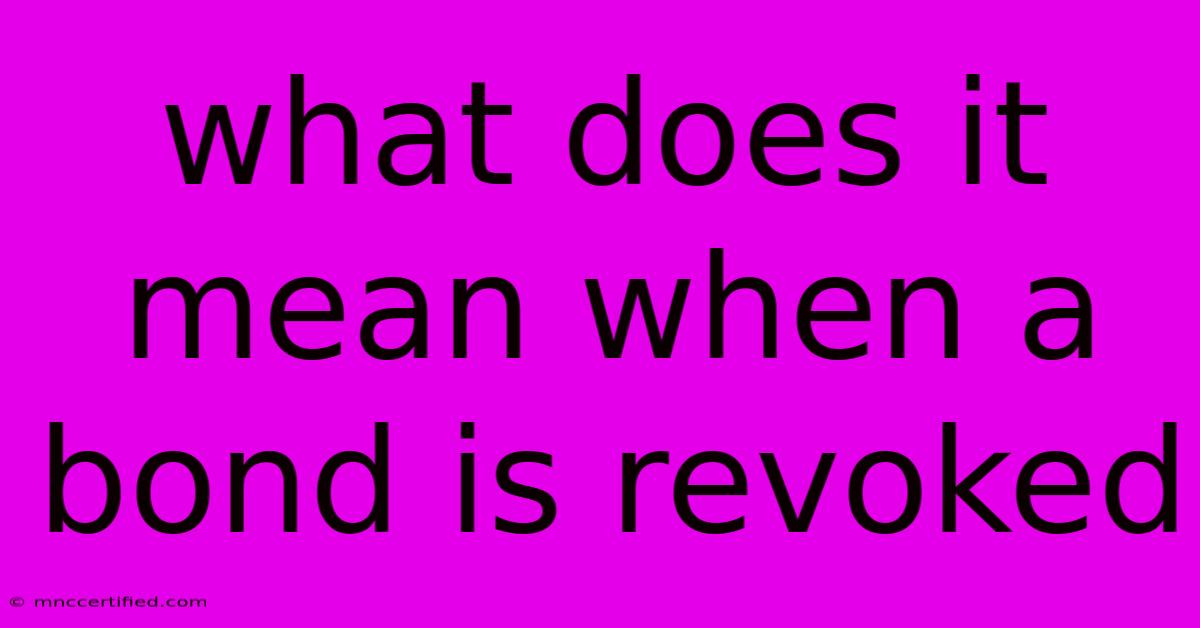What Does It Mean When A Bond Is Revoked

Table of Contents
What Does It Mean When a Bond is Revoked?
The term "bond" can refer to various things, from financial instruments to interpersonal relationships. In the context of legal and financial matters, a bond revocation carries significant weight and can have major consequences. This article will explore the meaning of bond revocation in different scenarios, focusing on the implications and how it affects individuals and organizations.
Understanding Bonds: A Quick Overview
Before diving into revocation, let's clarify what a bond is:
- Financial Bonds: These are debt securities issued by corporations, governments, or other entities to raise capital. Bondholders lend money in exchange for regular interest payments and the promise of repayment of the principal amount at maturity.
- Surety Bonds: These bonds act as guarantees of performance or financial responsibility. They are commonly used in construction, legal proceedings, and various business operations. A surety bond ensures that a party will fulfill its obligations or compensate for any losses incurred due to non-performance.
- Personal Bonds: These are not financial instruments but refer to a strong connection, trust, or loyalty between individuals.
Bond Revocation in Financial Context
While bond revocation isn't common in traditional financial markets, it can occur under specific circumstances:
- Default: If a bond issuer fails to meet its obligations (e.g., interest payments or principal repayment), bondholders may have the right to revoke the bond. This can lead to a loss of investment and potential legal action.
- Call Provisions: Some bonds come with call provisions, allowing the issuer to repurchase the bonds before maturity. This can happen if interest rates decline, enabling the issuer to refinance at a lower rate. While not technically a revocation, it can be considered a form of bond "cancellation."
Bond Revocation in Legal and Business Contexts
Surety bonds are most commonly associated with revocation. Here are some key scenarios:
- Breach of Contract: If a party fails to fulfill the terms of a contract covered by a surety bond, the surety company may revoke the bond. This triggers the surety's obligation to cover the losses incurred by the injured party.
- Misconduct or Fraud: If a bond holder engages in fraudulent activities or violates the terms of the bond agreement, the surety company can revoke the bond.
- Financial Instability: If a bondholder faces financial difficulties or insolvency, the surety company may revoke the bond to minimize their own risk.
Consequences of Bond Revocation:
The consequences of a bond revocation vary depending on the specific type of bond and the situation. However, some common outcomes include:
- Financial Losses: The party whose bond was revoked may face significant financial losses, especially if the bond was essential for fulfilling contractual obligations.
- Legal Actions: Bond revocation can lead to legal disputes, with the surety company seeking compensation for any losses they incur.
- Reputational Damage: Revocation can damage the reputation of the bondholder, making it difficult to obtain future bonds or secure contracts.
Understanding the Revoked Bond Notice
When a bond is revoked, the surety company will typically issue a formal notification. This notice will outline the reasons for revocation and the actions the bondholder needs to take. It's crucial to carefully review the notice and understand the implications.
Seeking Legal Advice
If you receive a bond revocation notice, it's essential to seek legal advice from a qualified attorney. They can help you understand your rights and obligations, negotiate with the surety company, and navigate the legal process if necessary.
In Conclusion:
Understanding the meaning of bond revocation is crucial for individuals and organizations involved in legal, financial, or business transactions. Knowing the potential risks and consequences of bond revocation can help you avoid costly mistakes and protect your interests. By seeking legal advice and adhering to the terms of your bond agreement, you can minimize the chances of facing a bond revocation and its associated consequences.

Thank you for visiting our website wich cover about What Does It Mean When A Bond Is Revoked. We hope the information provided has been useful to you. Feel free to contact us if you have any questions or need further assistance. See you next time and dont miss to bookmark.
Featured Posts
-
Inauguration Day 2021 Trumps Takeover
Nov 07, 2024
-
Do I Need Dental Insurance For My Newborn
Nov 07, 2024
-
Walzs Focus Shifts After Vp Bid Loss
Nov 07, 2024
-
West Indies Bowl In Decider Squad Changes
Nov 07, 2024
-
Uefa Champions League Bayern Vs Benfica Live Score
Nov 07, 2024